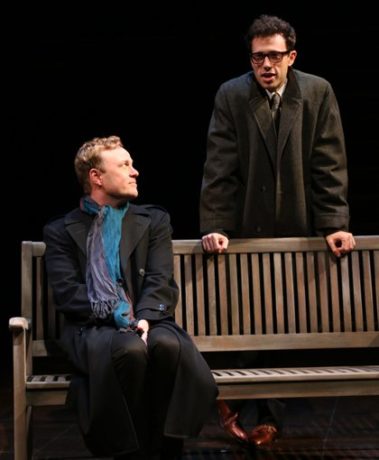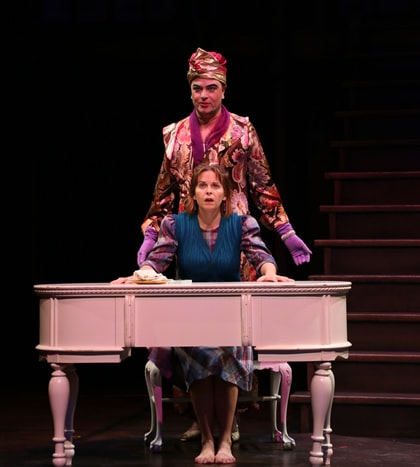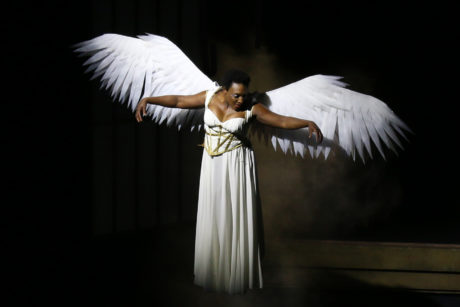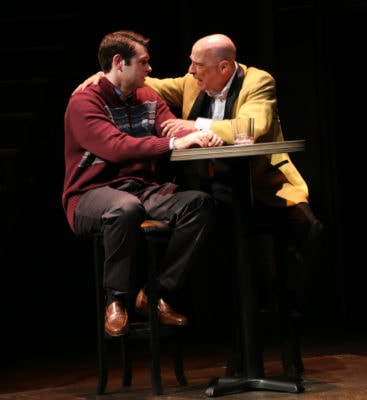Social, political, and historical forces collide and converge to mirror the conflicted inner worlds of the fascinating characters in Playwright Tony Kushner’s audacious, insightfully subversive, and groundbreaking play Angels in America: Millennium Approaches which is now thrilling audiences at Bethesda’s Round House Theatre.

Directed with passionate fervor and sardonic wit by Jason Loewith (and co-produced with the Round House Theatre and Olney Theatre Center) this play has always stirred up complex emotions in its dramatic intensity coupled with Kushner’s frequent references to touchstones of play and film culture (The Wizard of Oz, Come Back, Little Sheba, The Glass Menagerie, and A Streetcar Named Desire to name just a few -).
Kushner propels his epic play forward with his trenchant, probing dialogue that is decidedly anti-capitalist, pro-Socialist and philosophically progressive with an idealistic passion for equality for all and hopes for a heavenly utopia on earth. His characters do get caught up in the maelstrom that is the messiness of life but, concurrently, they never give up on their dreams —however broken they may be.
The spirits of an enigmatic Angel does indeed hover over these characters but this air of spiritual ether is subverted by Kushner’s deft, pithy one-liners and his free-wheeling comic sense of all the dimensions of his characters even when they are in torment or pain.
Director Loewith’s approach here is complex but I believe that he is stressing the theme of apocalyptic doom and the inability of individuals who love one another to truly understand one another and connect; then, he embellishes these dramatic themes with a decided emphasis on the quirkily witty monologues and one-liners that embody all the rich humor underlining the dramatic arc of Kushner’s text.
To produce Angels in America is a challenging and daunting task as this “Gay Fantasia on National Themes” (as Kushner aptly subtitles the play) is a veritable phantasmagoria of styles from epic to poetic naturalism to an almost “Brecht-ian” theatrical flavor. Whether we witness intricate monologues full of rich allusions, an angel descending from the heavenly spheres, or the clever Scenic Design (Kudos to Scenic Designer James Kronzer)—it is apparent that we have entered the world of the Theatre with a capital “T” (yet Playwright Kushner never wavers from the extreme humanism and emotional intimacy in many of this play’s seminal moments).
Kronzer’s set is indeed a modernistic marvel to behold with metallic-like panels enveloping the stage and a raised platform/walkway that allows the eye to drift heavenward and –also, allows concurrent scenes to be played at once. This very functional set allows sliding platforms to converge on the stage horizontally or one can delight in a trap door that will descend or arise with a character when the situation calls for it.
Kushner’s writing is so incredibly verbal and densely-etched that it is imperative that the actors know their lines so well that they are able to relax and totally inhabit the many layers of their characters.
All of the actors play more than one role and, occasionally, play roles of the opposite sex—thus, gender fluidity is espoused in Kushner’s play. Topics of sexuality, class, religion, politics and ideology are all given free rein in this absorbing play.
Director Loewith’s marvelous ability to stage two differing scenes at the same time to convey the same universal emotions is strikingly effective. In a pivotal moment in the play, the characters of Harper (Kimberly Gilbert) and Joe (Thomas Keegan) are angrily dissolving their marriage and admitting their secrets and torments. This scene is stunningly played in the same moment as we, concurrently, witness the disarmingly honest Louis (Jonathan Bock) and his former lover Prior Walter (Tom Story) quarreling with one another in rage at emotional abandonment. This scene is highly effective as shades of film Director Robert Altman’s technique of overlapping dialogue entered my thoughts.

Another standout of a scene is the wonderfully witty and real interchange of pseudo-political “non –stop” talking about social class and racism by Louis (so astutely played by Jonathan Bock) as he chats on and on while the deadpan and very realistic, sardonic glazed eyes of actor Jon Hudson Odom (who plays the character Belize) peer right over many of the semantic redundancies of his slightly manic friend. Actors Bock and Odom have an actors “field day” in this scene and it rings so truthfully. Throughout the proceedings, actors Bock and Odom are wonderfully in character and a pleasure to watch.
As the main character, Prior Walter, who is ravaged by the horrors of AIDS (in the era of Reagan’s unconscionable ignoring of the disease), actor Tom Story delivers perhaps the most cunningly subtle performance of the ensemble. Story is fully in the moment every moment he is on stage. His vocal delivery is also beautifully expressive and nuanced.
Tom Story delivers a highly impressive bit of stage business that could be “over the top” as his character appears as a highly-fraught drag queen in a hallucinogenic dream of the pill-popping character of Harper. As I just mentioned, however, Story plays the part with a very subtle and wry delicacy that deflates any vestige of “the screaming Queen”! He also delivers a superior, emotionally-charged monologue towards the end of the play as he talks to his nurse (the very accomplished and versatile actress Dawn Ursula) about his terrible pain.

Ms. Ursula was also mesmerizing in her other roles as a realtor, the Angel, and –especially –as the homeless woman that Joe’s Mother (Sarah Marshall) meets in the city streets. Ms. Ursula’s comic and dramatic timing was exceptional as she portrayed a mentally disturbed denizen who is surviving by her wits and sheer endurance.
As for the aforementioned Sarah Marshall, as per usual, she delivers the acting goods with the consummate skill that makes her one of the most interesting and continually surprising actresses that we are lucky enough to grace our stages.
Whether portraying the ghost of Ethel Rosenberg (who comes back to haunt Mitchell Hébert ruthless Roy Cohn), the direct yet caring Mormon Mother of Joe or the Rabbi Chemelwitz), Marshall’s every movement and reaction seems as if it just suddenly occurred to her and, thus, we have a study in seemingly pure spontaneity (when some actors telegraph their emotions, we can only take further delight in an actress who never goes for the calculated effect).
As I have alluded to, the staging is immaculate, meticulous and efficient in all aspects—one being the marvelous hallucinogenic scenic wonderland that is the continent of Antarctica. Scenic Designer Kronzer again works wonders as we watch snow fall and as we see a magnificent visual projection of snow and mountains that envelops the back of the stage (Bravos to Projection Designer Clint Allen who also provides such outstanding visuals as evocative starlit skies and the sweeping of Angel’s wings).
Into this cold icy sphere steps the tantalizingly talented actress Kimberly Gilbert as she portrays the despairing, eccentric and pill-addicted character of Harper. The wonderful Ms. Gilbert evokes a myriad of emotions with skill —from anger to hurt to defiance and to foggy incomprehension. Aside from this penultimate scene played to the hilt by Ms. Gilbert, she is superb when she is ranting and talking to herself in her New York apartment –almost akin to an inner monologue that pulls the audience inside to the echo chambers of the character’s heart.

As Joe Pitt, the idealistic young law clerk, unhappy husband of Harper, and potential protégé of lawyer Roy Cohn, Thomas Keegan works hard, has an earnest presence, and acquits himself onstage with discipline.
As Roy Cohn, respected actor Mitchell Hébert, also gives an earnest performance that certainly hit all the right callous and venal notes of the well-known historical character of the ambitious Cohn.
The pulsating, progressive and urbane musical passages that were played between scenes courtesy of Sound Designer Joshua Horvath had an invigorating immediacy that befits this play perfectly.
Lighting Designer York Kennedy works miracles with exquisite lighting that was appropriate for the many moods of the various scenes.
Costume Designer Ivania Stack has designed top-notch costumes for the ensemble—whether they were of a past historical period or of the present time of the play.
This production comes at a very relevant time for today’s audiences in that it is a very political year and America is making hard decisions. Having seen both parts of this play twice before, I must say that the Round House Theatre and the Olney Theatre Center have given us a new and refreshing interpretation of Angels in America that Playwright Kushner would applaud.
Angels in America: Part Two: Perestroika beckons us onwards!
Running Time: Three hours, with two 15-minute intermissions.
Round House Theatre and Olney Theatre Center’s Angels in America: Part 1: Millennium Approaches plays through October 30, 2016 at Round House Theatre -4545 East-West Highway, in Bethesda, MD. For tickets, call the box office at (240) 644-1100, or purchase them online.
Angels in America: Part 1: Millennium Approaches is presented in alternating repertory with Angels in America: Part Two: Perestroika.
RATING:





